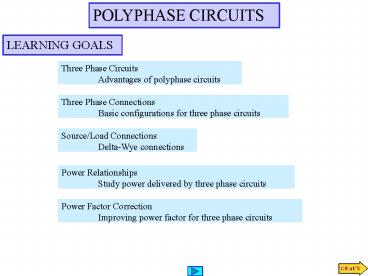POLYPHASE CIRCUITS - PowerPoint PPT Presentation
1 / 35
Title:
POLYPHASE CIRCUITS
Description:
Compute the magnitude of the line voltage at the load. Source is Delta connected. ... Delta-connected load consists of 10-Ohm resistance in series. with 20-mH ... – PowerPoint PPT presentation
Number of Views:2134
Avg rating:5.0/5.0
Title: POLYPHASE CIRCUITS
1
POLYPHASE CIRCUITS
LEARNING GOALS
Three Phase Circuits Advantages of polyphase
circuits
Three Phase Connections Basic configurations for
three phase circuits
Source/Load Connections Delta-Wye connections
Power Relationships Study power delivered by
three phase circuits
Power Factor Correction Improving power factor
for three phase circuits
2
THREE PHASE CIRCUITS
3
(No Transcript)
4
THREE-PHASE CONNECTIONS
5
SOURCE/LOAD CONNECTIONS
BALANCED Y-Y CONNECTION
For this balanced circuit it is enough to analyze
one phase
6
LEARNING EXAMPLE
For an abc sequence, balanced Y - Y three phase
circuit
Determine the phase voltages
The phasor diagram could be rotated by any angle
7
LEARNING EXAMPLE
For an abc sequence, balanced Y - Y three phase
circuit
Because circuit is balanced data on any one phase
is sufficient
Determine line currents and load voltages
8
LEARNING EXTENSION
For an abc sequence, balanced Y - Y three phase
circuit
9
LEARNING EXTENSION
For an abc sequence, balanced Y - Y three phase
circuit
Determine source phase voltages
Currents are not required. Use inverse voltage
divider
10
DELTA CONNECTED SOURCES
11
LEARNING EXAMPLE
Determine line currents and line voltages at the
loads
Analyze one phase
Determine the other phases using the balance
12
Compute the magnitude of the line voltage at the
load
LEARNING EXTENSION
Analyze one phase
Only interested in magnitudes!
13
DELTA-CONNECTED LOAD
Method 1 Solve directly
Method 2 We can also convert the delta
connected load into a Y connected one. The same
formulas derived for resistive circuits are
applicable to impedances
14
(No Transcript)
15
SUBTRACT THE FIRST TWO THEN ADD TO THE THIRD TO
GET Ra
16
Delta-connected load consists of 10-Ohm
resistance in series with 20-mH inductance.
Source is Y-connected, abc sequence, 120-V rms,
60Hz. Determine all line and phase currents
LEARNING EXAMPLE
17
POWER RELATIONSHIPS
18
LEARNING EXAMPLE
Determine the magnitude of the line currents and
the value of load impedance per phase in the delta
19
LEARNING EXAMPLE
For an abc sequence, balanced Y - Y three phase
circuit
Determine real and reactive power per phase at
the load and total real, reactive and complex
power at the source
20
Determine the line currents and the combined
power factor
LEARNING EXAMPLE
Continued ...
21
LEARNING EXAMPLE continued .
22
A Y -Y balanced three-phase circuit has a line
voltage of 208-Vrms. The total real power
absorbed by the load is 12kW at pf0.8 lagging.
Determine the per-phase impedance of the load
LEARNING EXTENSION
23
Determine real, reactive and complex power at
both load and source
LEARNING EXTENSION
24
A 480-V rms line feeds two balanced 3-phase
loads. The loads are rated Load 1 5kVA at 0.8
pf lagging Load 2 10kVA at 0.9 pf lagging.
LEARNING EXTENSION
Determine the magnitude of the line current from
the 408-V rms source
25
POWER FACTOR CORRECTION
Similar to single phase case. Use capacitors to
increase the power factor
Balanced load Low pf lagging
Keep clear about total/phase power, line/phase
voltages
To use capacitors this value should be negative
26
LEARNING EXAMPLE
27
LEARNING EXAMPLE
28
LEARNING EXAMPLE
MEASURING POWER FLOW
Which circuit is the source and what is the
average power supplied?
Phase differences determine direction of power
flow!
System Y is the source
29
INCREMENTAL COST OF POWER FACTOR CORRECTION
LEARNING EXAMPLE
How much capacitance is required to improve the
power factor by a fixed amount (say 0.01)
30
CAPACITOR SPECIFICATIONS
Capacitors for power factor correction are
normally specified in VARs
Capacitor 1 is not rated at high enough voltage!
Capacitor 3 is the best alternative
31
LEARNING BY DESIGN
Proposed new store
Wire is OK
32
DESIGN OF A 3-PHASE EMULATOR
LEARNING EXAMPLE
33
3-PHASE EMULATOR - CONTINUED
- SOLUTION
- Use RC network for -60 deg (lag)
- Use inverter for -180 phase shift
34
3-PHASE EMULATOR - CONTINUED
35
3-PHASE EMULATOR PROPOSED SOLUTION































